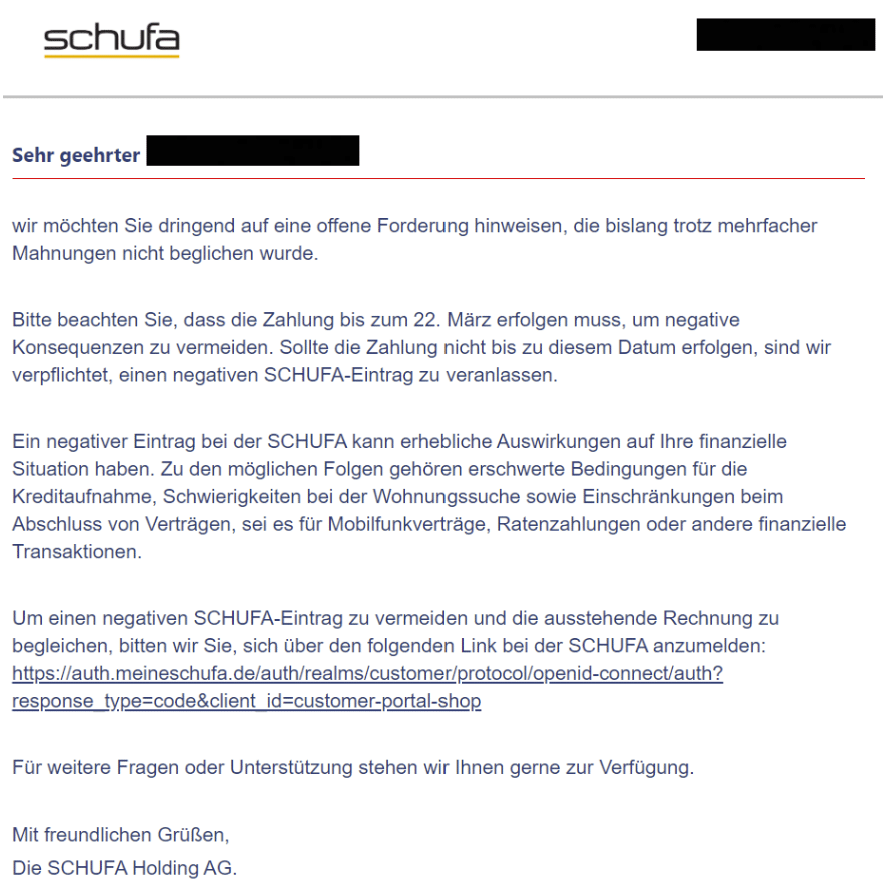An alarming message landed in the digital mailboxes of many Germans, which at first glance appears to come from SCHUFA Holding AG. Under the subject line “Impending negative SCHUFA entry,” recipients are led to believe that they have outstanding claims that have not been paid despite multiple reminders. The threat: A negative entry with SCHUFA if payment is not made by March 22, 2024. Such an entry could have serious consequences for the financial reputation of those affected, which increases the urgency and pressure on the recipients.

The emails usually contain a link that supposedly leads to authentication with SCHUFA. However, behind this lies a classic phishing attempt: Anyone who clicks on the link and enters their data will give it to the fraudsters directly on a silver platter. Official institutions, including SCHUFA itself, do not send threatening emails and never ask people to disclose sensitive data via unsafe channels.
Despite official warnings, including on the SCHUFA website from March 14, 2024 , many people still fall for such fraud attempts. The sender address of the fraudulent emails does not immediately indicate a phishing attempt. Only upon closer inspection do you notice that it has a country-specific domain that originates in Belgium. This is a clear indication that this is an attempted scam.
The mechanisms behind phishing emails
Phishing emails are a popular tool used by fraudsters to obtain personal and financial information. The tactic of building pressure with the threat of consequences such as a negative SCHUFA entry plays on people's fears. The emails are often designed in such a way that they appear authentic at first glance, which increases the risk of successful fraud.
How you can protect yourself
To protect yourself from such fraud attempts, it is important not to click on links in suspicious emails and not to disclose any personal information. Always check the authenticity of the sender and be wary of emails that urge you to act quickly, especially if they ask for money or reveal personal information.
Alternatives and suggested solutions
If you receive such an email, it is advisable to move it directly to the spam folder and not respond to it. To be on the safe side, you can report the incident to SCHUFA or the police. The official channels also offer information and assistance on how best to behave in such cases.
Questions and answers about “SCHUFA phishing”:
Question 1: What is a phishing attempt?
Answer 1: A phishing attempt is a scam in which criminals attempt to obtain personal or financial information via fake emails or websites.
Question 2: Why do fraudsters threaten with a SCHUFA entry of all things?
Answer 2: They use the fear of negative consequences for their creditworthiness to exert pressure and provoke quick, rash actions.
Question 3: How do I recognize a phishing email?
Answer 3: Signs include pressure to act quickly, requests to enter personal information via links, and inconsistencies in the sender address.
Question 4: What should I do if I receive such an email?
Answer 4: Do not click on any links, do not enter any data, mark the email as spam and report the incident.
Question 5: Can official bodies such as SCHUFA protect against phishing?
Answer 5: They inform and warn, but cannot guarantee individual protection against phishing.
Conclusion
The current wave of fraudulent SCHUFA phishing emails is a serious wake-up call to always be vigilant and critical when dealing with digital communication. The fraudsters behind these emails use sophisticated methods to feign credibility and exert pressure. It is important to be aware of these methods and take preventive measures, such as checking emails critically and not rashly clicking on links or entering personal information. Education and awareness play a key role in the fight against such fraud attempts. We all have a responsibility to stay informed and keep our digital environment safe.
Source: consumer advice center
Report suspicious activity and support educational efforts by subscribing to the Mimikama newsletter at https://www.mimikama.org/mimikama-newsletter/ and our online lectures and workshops at https://www.mimikama.education/ online-lecture-by-mimikama/ .
Also read:
Notes:
1) This content reflects the current state of affairs at the time of publication. The reproduction of individual images, screenshots, embeds or video sequences serves to discuss the topic. 2) Individual contributions were created through the use of machine assistance and were carefully checked by the Mimikama editorial team before publication. ( Reason )

